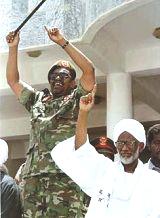PROFILE – Hassan Turabi Sudan Islamic leader
KHARTOUM, June 30, 2005 (Sudan Tribune) — Sudanese prominent Islamist Hassan Turabi, detained last year on suspicion of plotting a coup, was freed today.

|
|
Sudanese President Omar Hassan Ahmed Bashir, left, seen in a 1995 photo, with his former mentor Hassan al-Turabi. |
The political climate in Khartoum has improved since the government and southern rebels signed an agreement in January ending more than 20 years of civil war.
“All political detainees will be released,” Beshir said in an address commemorating the 16th anniversary of Sudan’s National Salvation Revolution.
The man who exercises power behind the scenes in Khartoum has been in prison since March 2004- put there by his former ally, Sudan’s president Omar al-Bashir.
He is said to have an enormous influence on Islamic groups in Sudan, and also has alleged links with one of the rebel groups in Darfur, JEM (Justice and Equality Movement). His power clearly stretches far beyond the city gates of Khartoum.
Analysts say “Darfur is a victim of the split within the National Islamic Front personified by former spiritual leader of the organisation, Dr Hassan al-Turabi and his former protegé, General Omar al-Bashir, the president.
They were thought to belong to the PC but Turabi’s son Issameddin, who put their number at more than 27, denied it, saying the coup was invented to provide a pretext to crack down on the party and purge the army of Darfuris and other westerners.
Turabi himself has linked the crackdown to government charges that his party supported the year-old rebel movement among Darfur’s indigenous non-Arab minorities, an allegation he vigorously denied.
Turabi criticised government policy in Darfur and said the conflict should not have been separated from the efforts to end the long-running civil war in south Sudan.
Turabi’s release in October 2003 was part of what the government called reconciliatory efforts to “prepare for the coming peace era” as Khartoum nears a settlement with southern rebels.
An Islamist ideologue with influence beyond Sudan’s borders, Turabi backed the 1989 military coup which brought Beshir to power but was removed from key political posts after losing a power struggle with the president in 1999.
He was arrested along with many of his followers in February 2001 after the PC signed a memorandum of understanding in Switzerland with southern rebels of the Sudan People’s Liberation Army (SPLA).
Hassan Abdallah Dafa’allah al-Turabi was born in 1932 in the northeastern town of Kassala near the Eritrean border. His family has a long tradition in academia and Sufism, the mystical and spiritual dimension of Islam.
A law graduate from the University of Khartoum, Turabi later earned a master’s degree from a British university in 1957 and then a doctorate from Paris’s Sorbonne University in 1964.
Wooed by the Islamists after returning from studies abroad, he became secretary of the Charter Front (Gabhat al-Mithak), a forerunner of the Muslim Brotherhood in Sudan.
He married Wisal al-Mahdi, sister of Umma Party leader Sadiq al- Mahdi and descendant of a Sudanese legend, the leader of the Mahdi uprising against the British in the 1880s.
After a military coup of Gen Gaafar Nimeiri in 1969, Turabi was imprisoned for seven years, he nevertheless became state prosecutor in 1979.
He approved Nimeiri’s decision to impose Sharia, or Islamic law, in 1983, which sparked a rebellion in the mainly animist and Christian south which has endured to this day.
After the Nimeiri dictatorship fell in 1986, he formed the National Islamic Front and ran unsuccessfully in legislative elections.
After forming a coalition with Sadiq al- Mahdi, Turabi was appointed minister of justice, later minister of foreign affairs and finally deputy prime minister.
In 1989, he rallied behind Beshir, an obscure military man who had just been promoted to general, to overthrow the democractically-elected government of his brother-in-law, Sadeq al-Mahdi, head of the Umma Party.
As senior statesman, he became what many considered to be the real power behind the throne of a country which he directed towards rigorous Islamic practices, particularly affecting the rights of women.
In 1996, he was made speaker of parliament until he fell out with Bashir a few years later. Turabi was stripped of his role as speaker, but went on to form the Popular National Congress. He has since become the most prominent Islamist in opposition.
Analysts say the mild-mannered Turabi is the mastermind behind the political, ideological and organizational development of the Islamic movement in Sudan. He is mainly responsible for steering Sudan toward the use of sharia or Islamic law as a system of governance.
